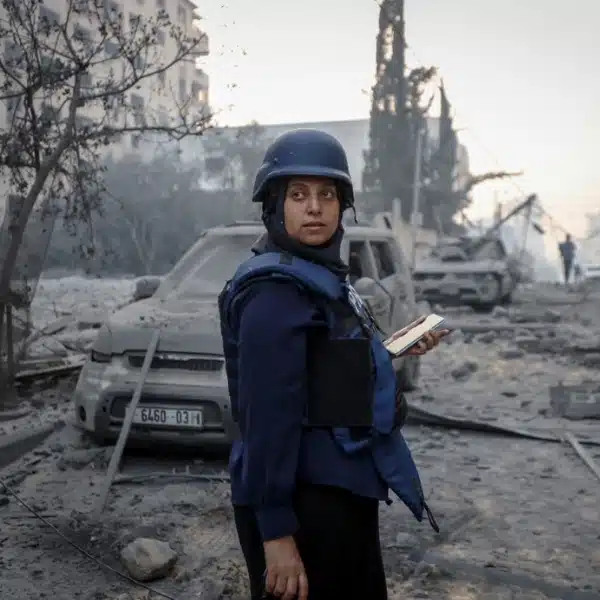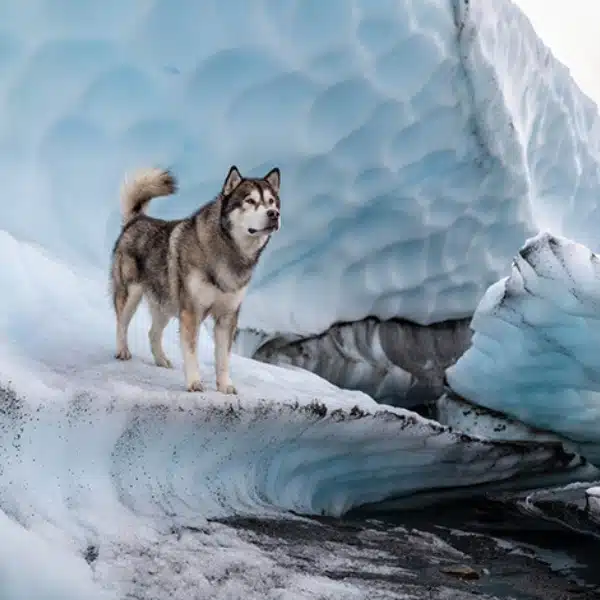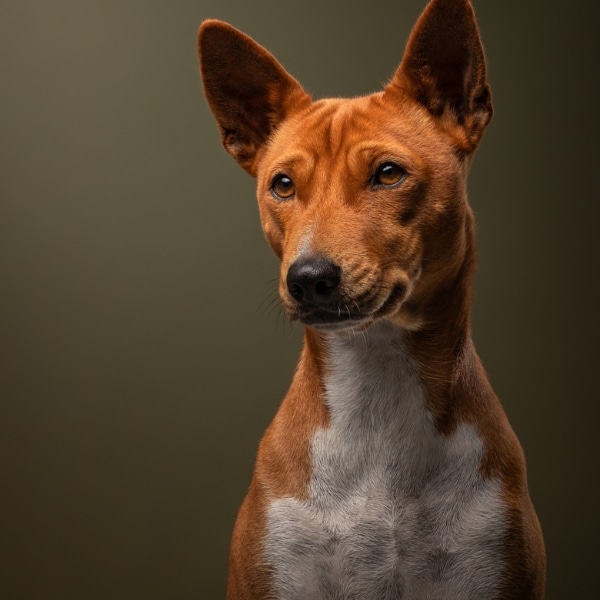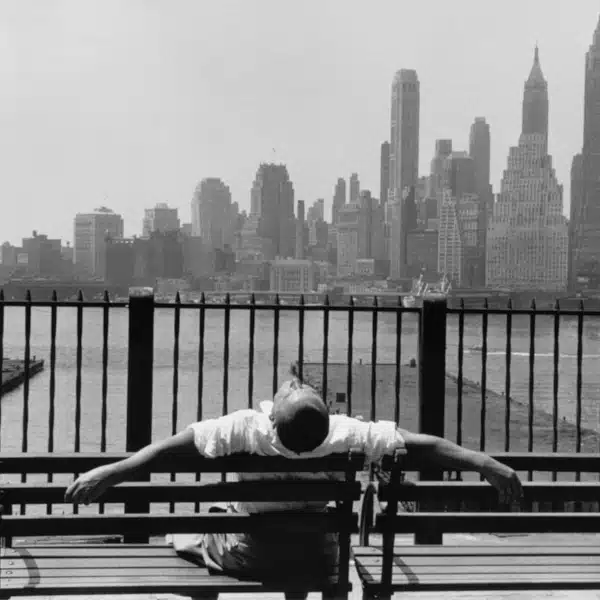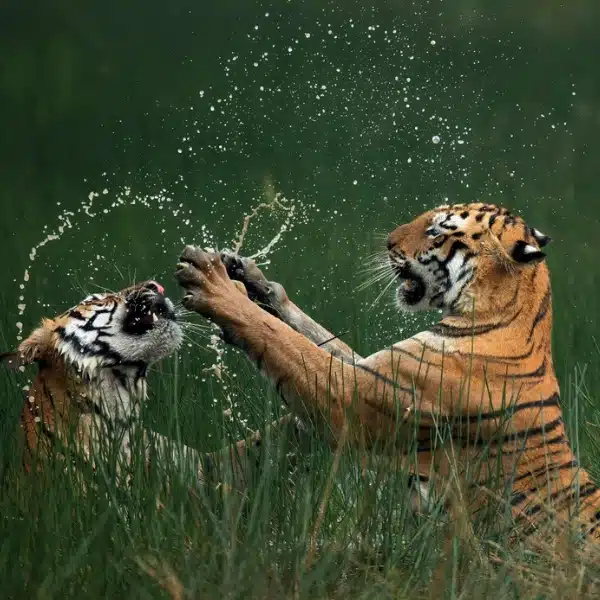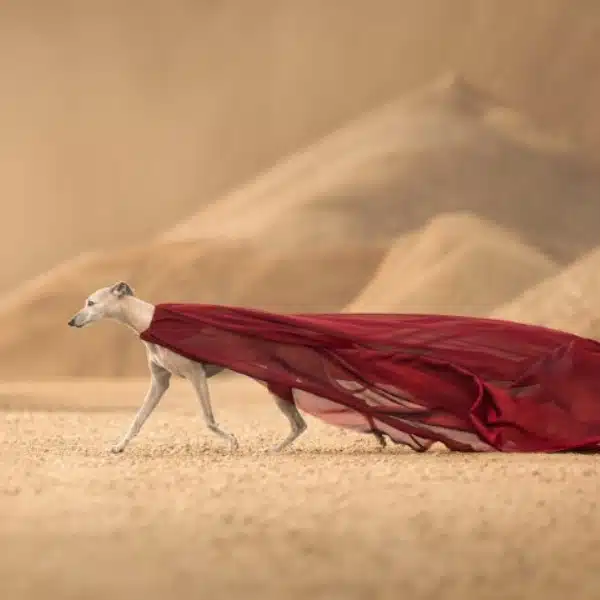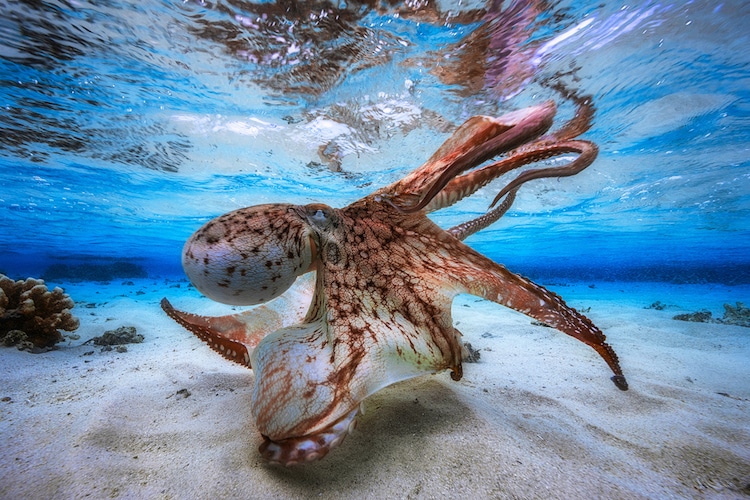
‘Dancing Octopus' by Gabriel Barathieu (France). Winner, Underwater Photographer of the Year.
“In the lagoon of Mayotte, during spring low tides, there is very little water on the flats. Only 30 cm in fact. That’s when I took this picture. I had to get as close as possible to the dome to create this effect. The 14 mm is an ultra wide angle lens with very good close focus which gives this effect of great size. The octopus appears larger, and the height of water also. Also, I didn’t need flash because I had lots of natural light.”
What lurks beneath? Underwater photographers help us grasp the ecosystems and relics that inhabit deep waters beyond our vision. And since 1965, the Underwater Photographer of the Year (UPY) competition has awarded prizes to photographers in eight categories.
This year, winner Gabriel Barathieu beat out underwater photographers from 67 countries to claim the Underwater Photographer of the Year prize. His winning shot, Dancing Octopus, is the perfect balance of vibrant colors and usage of a wide angle lens.
Juror Alex Mustard enthused, “Both balletic and malevolent, this image shows that the octopus means business as it hunts in a shallow lagoon. The way it moves is so different from any predator on land, this truly could be an alien from another world. A truly memorable creature, beautifully photographed.”
Let's take a look at some of the spectacular winning images. And if you can't get enough, the Underwater Photographer of the Year Yearbook contains 100 magical, underwater images from this year's competition.
Each underwater photographer shares the story behind their winning image.

‘Out of the Blue’ by Nick Blake (UK). Winner, British Underwater Photographer of the Year. “Kukulkan Cenote on Mexico’s Yucatan Peninsula forms part of the Chac Mool system and is noted for the spectacular light effects as the sun penetrates the darkness. I left my strobes behind for the natural light shot I wanted and positioned myself in the shadows of the cavern. Moving my eye around the viewfinder, I could see that the rock outline of the cavern around me made for a pleasing symmetry and I adjusted my position to balance the frame.”
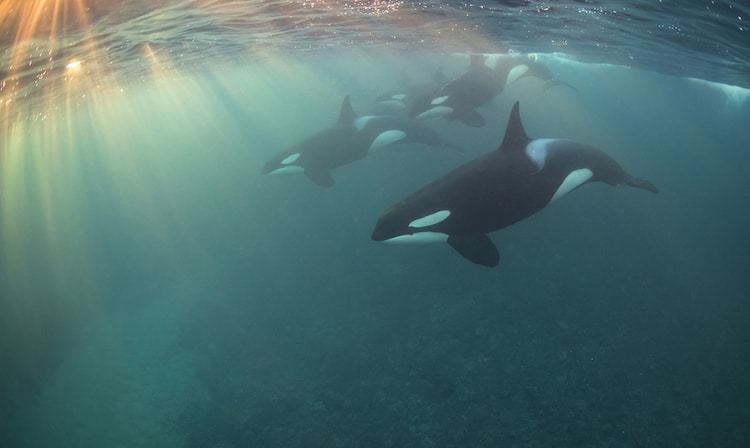
‘Orca Pod' by Nicholai Georgiou (UK). Winner, Most Promising British Underwater Photographer.
“Orcas are easily the most beautiful, intelligent and confident animals I’ve ever had the honor of spending time with. This photo was taken during an amazing week freediving with wild Orca in Norway. The days are quite short in winter and the water was around 5 degrees but we wore a thick wetsuit and of course with Orca around, the cold was quickly forgotten. The light had a really nice color from the setting sun as this graceful pod of Orca swam by nice and close. It was a moment which will be hard to top and I'm glad to have this image to share it.”
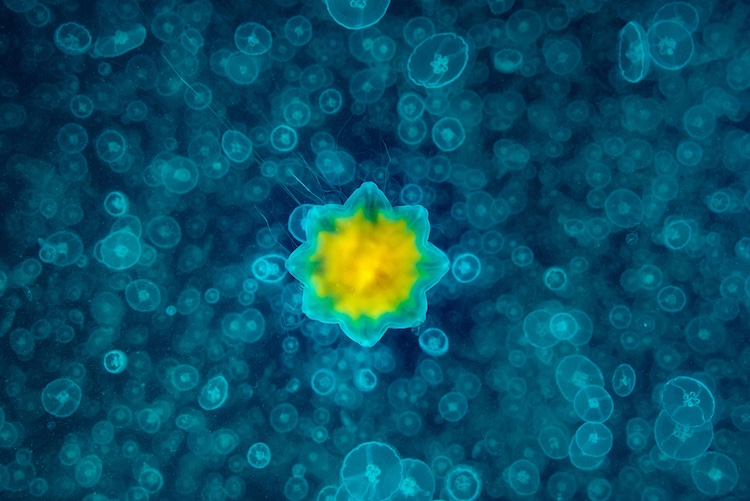
‘One in a Million' by Ron Watkins (USA). Winner, Wide Angle.
“Last summer I headed to Alaska in search of salmon sharks. We cruised in the boat looking for their dorsal fins for hours and that is when we came across an enormous moon jellyfish bloom that stretched for several hundred meters. The dense bloom of jellyfish ranged in depth from 2 meters to over 20 meters and we spent a lot of time in the water with them. It was surreal and more dense than anything I had ever experienced including Jellyfish Lake in Palau. I came across this Lion's Mane Jellyfish rising from the bloom towards the surface and positioned myself directly over it to capture this image.”
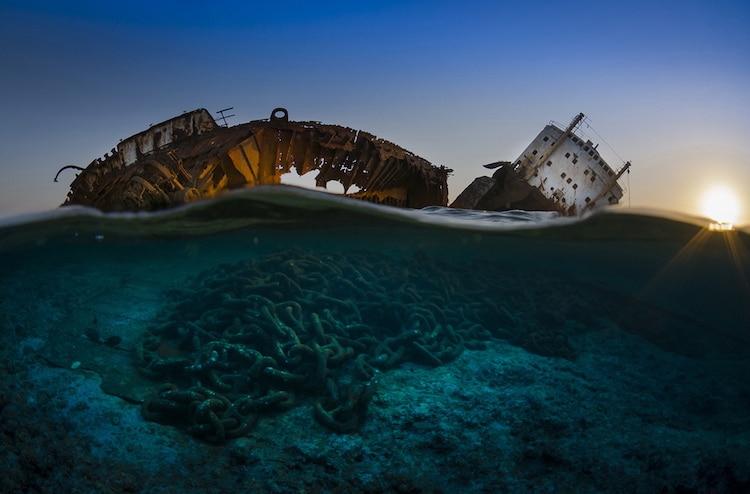
‘The wreck of the Louilla at sunset’ by Csaba Tökölyi (Hungary). Winner, Wrecks.
“This is the wreck of the Louilla resting on top of Gordon reef in the Straits of Tiran on the edge of the Sinai. Beneath her lies a pile of her anchor chains, giving the form of a whale. Wrecks become part of the eco-system in no time. Soft corals develop very soon and they can become shelter for schools of juvenile fish. But also, they can have a devastating effect on their surroundings. This wreck sits on top of Gordon reef, battered by the waves and is slowly deteriorating. Last summer, part of the superstructure collapsed, and the wreck lost it's epic, cinematic look. In a few decades, the reef should be free again from the remains of this once huge freighter.”
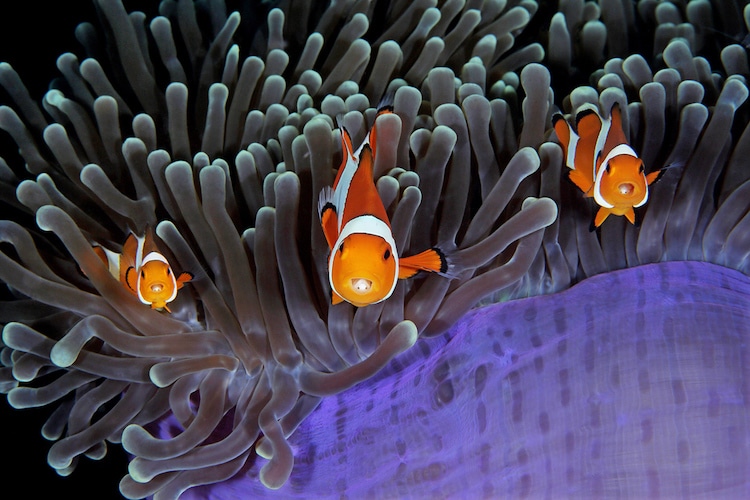
‘Your home and my home’ by Qing Lin (Canada). Winner, Behavior.
“lown anemonefish and anemones enjoy a symbiotic relationship. The parasitic isopods like to hang out in the mouths of anemonefish. Perhaps because of the isopods, Clown anemonefish often open their mouths. These three particular fish were very curious. As I approached, they danced about the camera lens. It took me six dives, patience and luck to capture the exact moment when all three fish opened their mouths to reveal their guests.”
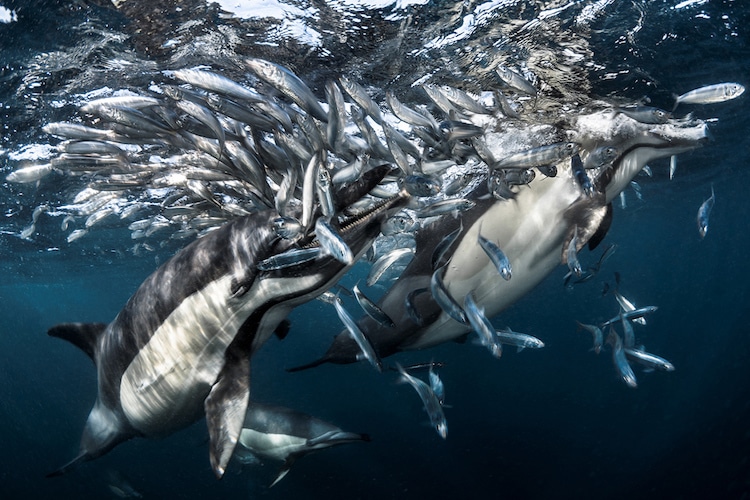
‘Dolphins hunting’ by Greg Lecoeur (France). Highly commended, Behavior.
“Since last year, sardines have become victims of overfishing and climate change. They are the main food source of marine life, many species such as penguins, sea lions, sharks, dolphins and more… are dependent on them for their survival. During their migration along the wild coast, all the predators work together to hunt sardines but the action is more and more unpredictable. To capture this moment, I had spent several days on the ocean to have one chance to witness this behavior.”
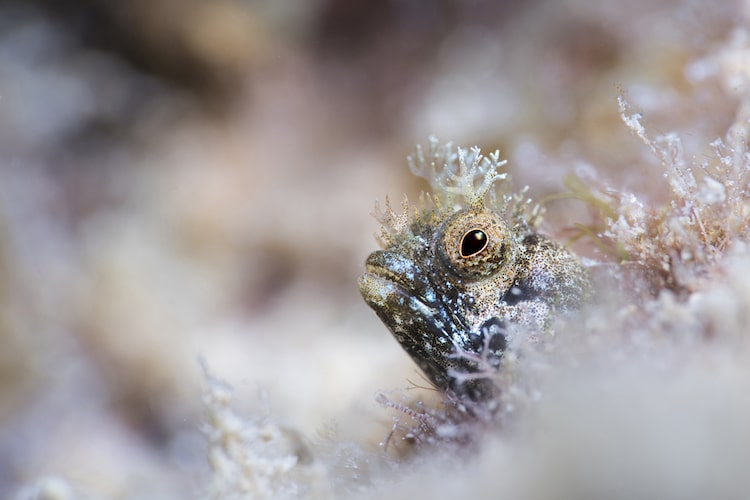
‘Medusa Blenny on the Lookout’ by Jade Hoksbergen (UK). Highly commended, Up and Coming.
“My fascination with blennies started in early 2016 when I was living in Saint Lucia and got my hands on an underwater camera for the first time. Having lived in the Philippines previously, blennies were a novelty to me despite their widespread presence in Saint Lucia. I thought they also made extremely interesting subjects due the range in their facial expression, sometimes akin to the grimaces one would associate with gargoyles. For this shot, I wanted illustrate the intricate detail of this blenny whilst showing how its color and texture blends seamlessly with its environment.”
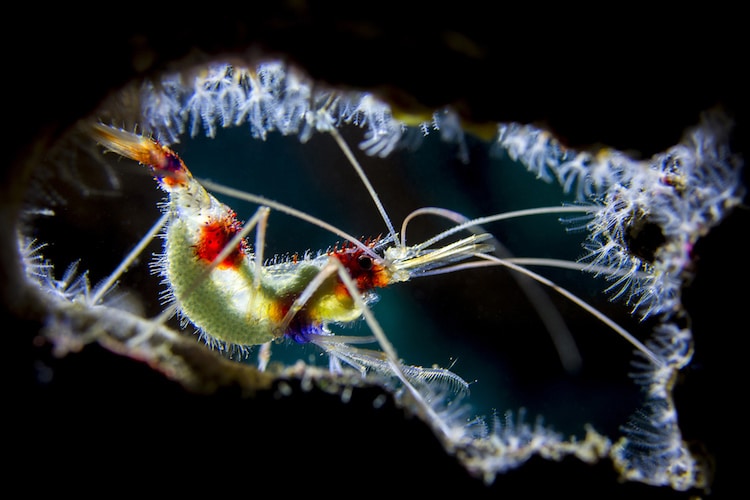
‘Backlight Shrimp’ by Fábio Freitas (Brazil). Highly commended, Macro.
” Shrimps are challenging subjects to photograph; we have to portray their beautiful colors and shape, and especially focus on the eyes. In the late afternoon, I was diving in my favorite dive site in Bonaire called “Something special” when I saw this shrimp underneath the rock in a perfect position to make a backlighting technique, using continuous lighting. Immediately I turned off my strobes and asked my buddy to put the lighting behind the shrimp, he was very good putting the light exactly where I wanted it. I took only 4 pictures and then the shrimp vanished.”
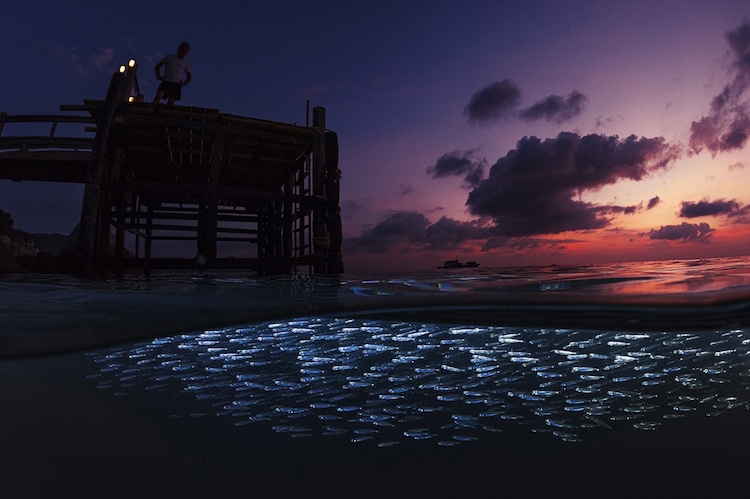
‘Silversides at Twilight’ by Tony Myshlyaev (Canada). Commended, Wide Angle.
“After finding this location, the jetty and silversides were on my mind for a long time. And when the monsoon rains took a short break, I jumped in the water to execute this idea. The main obstacle was that the school was too evasive for a fisheye lens and the sun was falling too fast to execute the idea. I began to compromise my settings and already considered the endeavor a loss but then some trevally arrived to feed. This was perfect, the silversides forgot about me. Simultaneously a passerby arrived. He positioned himself perfectly on the jetty above. Seeing the opportunity, I told him not to move and pressed the shutter as quickly as possible.”
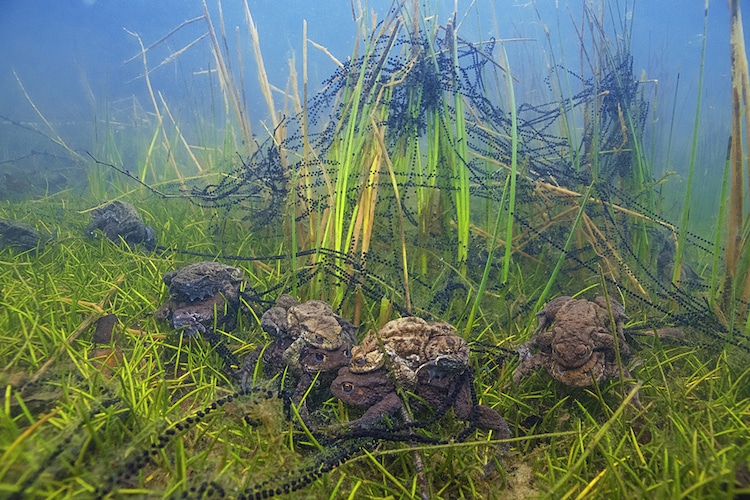
‘Toads mating’ by Luc Rooman (Belgium). Commended, Behavior.
“For several years we have been following toads mating in the fresh water lake of Turnhout (Belgium) usually in the months of March or April if the weather conditions are 8°C and with humid weather. The toads are in the shallow areas of the lake where we can take photos with natural light while snorkeling.”
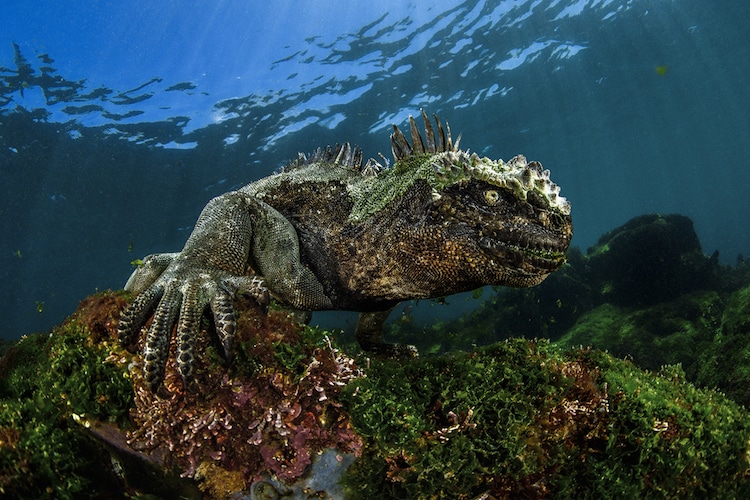
‘Imp of darkness’ by Damien Mauric (UK). Third place, Portrait.
“On his visit to the Galapagos islands, Charles Darwin was revolted by the animals' appearance, writing: “The black Lava rocks on the beach are frequented by large, disgusting clumsy Lizards. They are as black as the porous rocks over which they crawl & seek their prey from the Sea. I call them ‘imps of darkness'. They assuredly well-become the land they inhabit.” The marine iguana are all but monsters. Endemic to the Galapagos, it's a rare privilege to share a moment underwater with this animal now considered as an endangered species.”
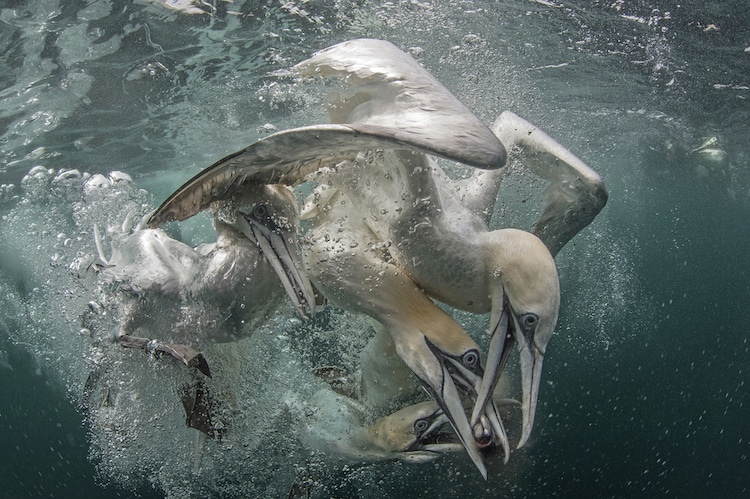
‘Competition' by Richard Shucksmith (UK). Runner up, British Waters Wide Angle.
“I was out off the coast making images for SCOTLAND: The Big Picture – a project about rewilding that produces images to amplify the case for a wilder Scotland. Hundreds of gannets were circling the boat looking for the fish that were being thrown over the side. Suddenly a single bird dives and the others seeing it as an indicator and 20, 30, 40 birds are diving at once. Because of this behavior competition between gannets is always going occur creating several gannets diving for the same fish. I could hear the birds as they hit the water right above my head just before they appeared in front of the camera.”
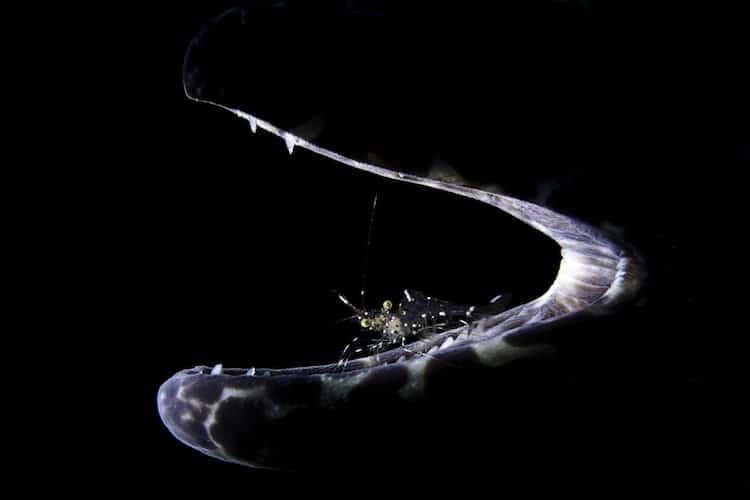
‘Cleaner’ by Liang Fu (China). Third place, Behavior.
“I found this cleaning station at 26 meters. On the first dive, I took a few front facing photos with cleaner shrimps in the moray eel's mouth. When I surfaced, I came up with an idea of a side-face moray eel, widely opening its mouth with the cleaner shrimp inside. So I tried a second dive and it turned out to be how I had imagined it.”
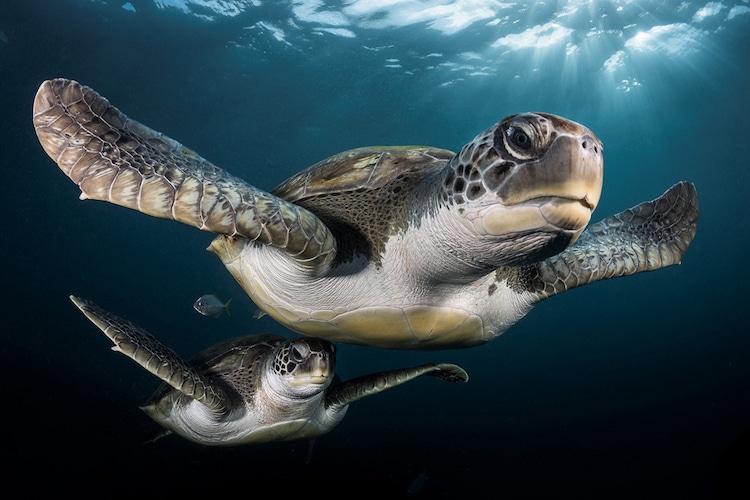
‘Green Turtles in the rays’ by Greg Lecoeur (France). Commended, Portrait.
“During a diving trip to Tenerife, I came across these green turtles. It was early morning and the sunbeams pierced the surface. I adjusted the setting of my camera and I waited for the turtles to come close enough to trigger my camera. After a little while, the turtles were circling around us and it was a great opportunity to photograph them.”
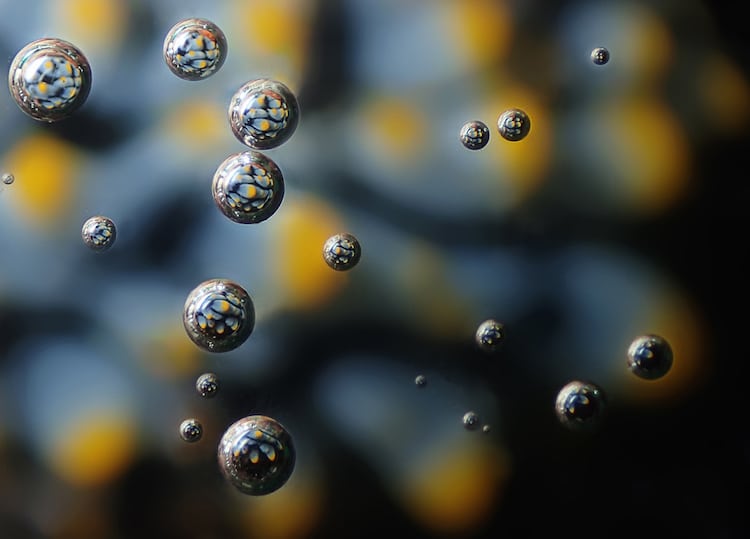
‘Nudi Art' by Katherine Lu (Singapore). Commended, Macro.
“I shot this photo in the local waters of Singapore where the visibility is 3m on average. Scuba divers I know are always surprised that I dive there and most don’t even know there is great macro right off our shores. I wanted to do something different and turn a nudi branch commonly found in our waters into a piece of art.”
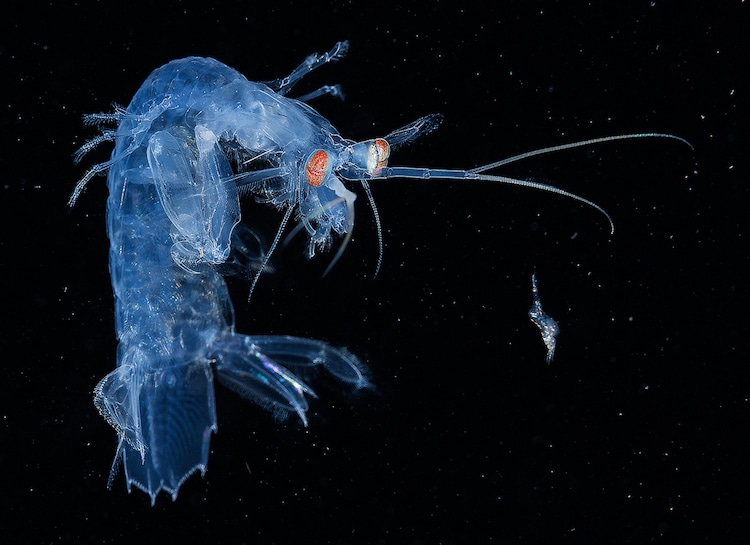
‘Prey?' by So Yat Wai (Hong Kong). Winner, Macro.
“This photo was shot during a blackwater dive in Anilao, Philippines. Even though the larvae mantis shrimp (left) is very small, it still a predator which uses its raptorial appendages to hunt. Has it spotted the prey and is ready to pounce?”
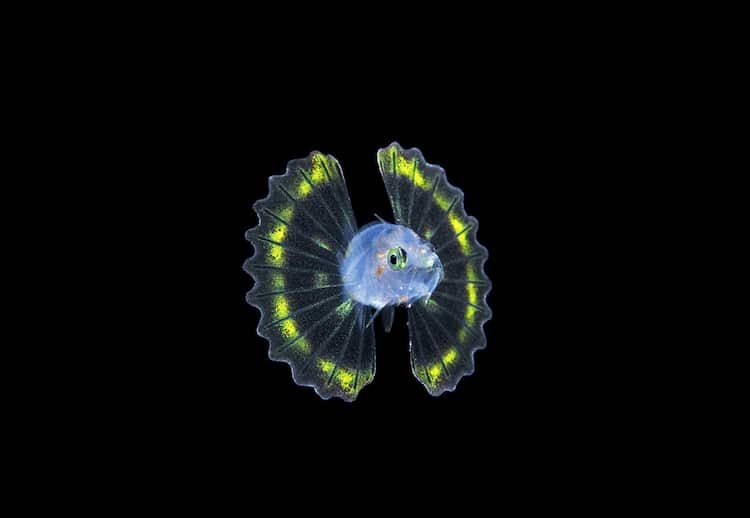
‘Larval Lionfish’ by Steven Kovacs (USA). Commended, Macro.
“This image was taken on a black water drift dive in Palm Beach, Florida to look for alien looking pelagic animals, plankton and the larval stages of many creatures that drift out in the open ocean in their early stages of development. Many of the animals seen during black water dives are very small and can move quickly when illuminated by powerful dive lights, so getting a nice image is, not only challenging but, very rewarding as well. On one particular dive I was very fortunate to come across this rare tiny Lionfish in its early larval stage and was fortunate to get a photograph of it just as it flared it's beautiful fins for the camera.”
Underwater Photographer of the Year: Website | Facebook











































































